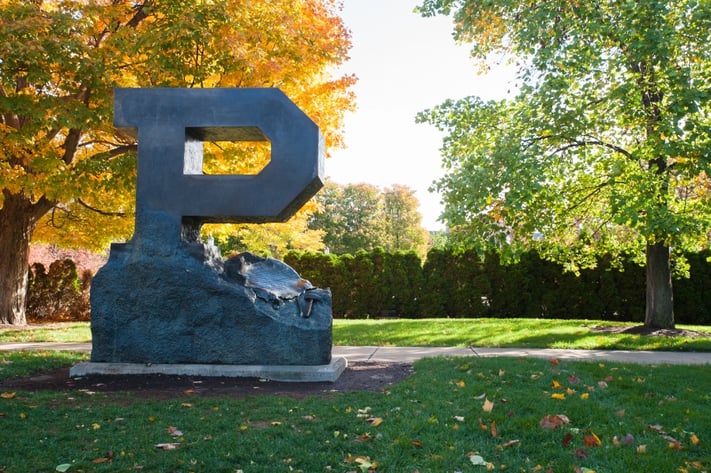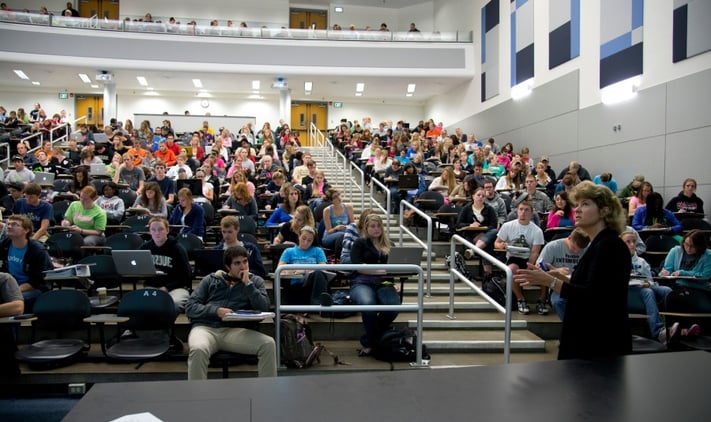
Finding a university that is a good match for your child can be stressful. In Singapore’s international school setting, many families consider universities in a wide range of countries beyond their home country. Here we outline some of the main differences between two popular destinations, the US and the UK.
This post is recommended reading for anyone with a High School age child in an international school.
Finding a university that is a good match for your child requires not just an understanding of them as a person and a learner, but also an understanding of the type of experience that different universities have to offer.
In Singapore’s international school setting, many families consider universities in either the UK and the US. For example, at UWCSEA, up to 65% of the graduating class go on to university in either the US or the UK–despite the fact that just under 30% of them have a passport from either of the two countries. This is not an unusual situation in international schools.
Students applying to both the US and the UK or to other countries as well are advised to develop a “worldwide” strategy for improving the likelihood of admissions offers. Below, UWCSEA’s university advisors provide a summary of the major differences between the two systems, unpack some of the myths and misconceptions and explain the pros and cons of each.
 There are some important distinctions that may make one country a better fit for your child than the other. (Purdue University/Rebecca Wilcox)
There are some important distinctions that may make one country a better fit for your child than the other. (Purdue University/Rebecca Wilcox)
UK or US?
While both the UK and the US have terrific reputations for higher education and are home to some of the most prestigious institutions in the world, the experience of attending university can be quite different in each country. There are some important distinctions that may make one country a better fit for your child than the other, depending on his or her interests, learning style and aspirations. Understanding the differences between the two countries’ educational experiences and admissions systems can help families to make strategic decisions about whether to encourage their child to pursue applications in one country or the other, or both.
The US system in particular can overwhelming for those who are not familiar with it, largely because of the sheer number of options. And then there is the hype surrounding the colleges like those in the ‘Ivy League’ and the difficulty in making sense of university rankings. That entry requirements are somewhat opaque at many colleges, and the fact that they appear to change from year to year, does not help.
While applications to universities in the UK are more straightforward, a review of the types of educational experience there and admissions criteria can help to clarify your understanding before your child decides to apply there (particularly if your child is aiming for Oxbridge...but even if they are not).

UK university applications are subject-specific; in the US it is perfectly acceptable to arrive without a clear idea of your major. (SONY DSC)
Commitment to course of study
In the UK, university applications are subject-specific. This means that a student applies for entry into a specific course. If your child is UK-bound, s/he will need to have a good idea of the direction s/he would like to head in by the end of Grade 11 (Year 12) or the beginning or Grade 12 (Year 13) at the very latest.
The UK allows students to study professional degrees in the first instance, as a Bachelor degree. Programmes such as the Bachelor of Medicine and the Bachelor of Laws are particularly popular. Students who apply for Engineering will in most cases have to identify the type they would like to pursue, i.e., Electrical Engineering or Mechanical Engineering, although there are some General Engineering options as well. Students can choose to study an enormous range of subjects, and sometimes can combine related subjects such as Political Economy or Psychology and Sociology. Families will be also surprised by the breadth of offerings in the UK, degrees, with degrees available in specialties as far and wide as Brewing and Distilling, Physiotherapy, Television Production and Puppet-Making.
At US universities, in most cases students apply for a place at the university, rather than in a specific course, and it is perfectly acceptable to arrive at a university without a clear idea about what they would like to specialize or “major” in. Professional and specialized degrees are less common in US as undergraduate degrees. It is possible to major in Engineering, Business or Architecture as a US undergraduate, but these programmes are not offered at all universities. In contrast, professional and highly specialized degrees are most often offered in the US as Master’s or PhD programmes.

In the US, Bachelor degrees take four years to obtain; most universities require that students sample courses in a broad range of subjects before specializing in the last two years. (Purdue University: Mark Simons)
Immediate Depth vs. Breadth followed by Depth
In the UK there are generally no general education or “distribution” requirements. Students take most of their classes in the area they applied for, with a few choices of electives. As a result, most degrees take only three years to complete, although Scotland requires students to take a wider selection of classes in the first year, and so Scottish degrees take four years. Engineering is another area in the UK where students should expect to stay for four years.
In the US, Bachelor degrees take four years to obtain; most universities require that students sample courses in a broad range of subjects before specializing or majoring in one or two subjects for the last two years. This flexibility makes it possible in the US to “double major” or major in two unrelated subjects, and at some US universities, students can design their own major to suit their particular interests.
While the US liberal arts and sciences approach makes it very easy for a student to change their mind about what to study, in the UK it is far less common but still feasible to change the original choice of subject to a related subject. There are also several combined and dual degrees in the UK that allow study in more than one subject, and liberal arts-type offerings are becoming more available.

In the US, Liberal Arts colleges, which focus solely on undergraduate education, are often as small as 1,200 students and offer residential living communities for all four years. (Matthew Thomas 2013)
Public vs. Private, Large vs. Any Size
The vast majority of the UK’s over 300 higher education options are government-funded rather than private, and are relatively large institutions, catering to both undergraduates pursuing Bachelor’s degrees and graduate students in Master’s and PhD programmes. The average size of a UK university is 15,000 students, and after the first year many students live independently off campus in their own accommodation.
While the US has many large, well-reputed state universities, funded by American states, most of the over 4,000 higher education options in the US are privately funded and endowed. Liberal Arts colleges, which focus solely on undergraduate education, are often as small as 1,200 students and offer residential living communities for all four years.
Year Abroad or Year in Industry
Study “abroad” has different definitions for TCKs who may already be planning to attend a university outside of their home country. It has become extremely popular for students to spend one term (semester) or one year away from their university, in another academic program in a different country. In the UK, entry in study abroad programs is often competitive, with opportunities being given to students who have demonstrated good grades. This experience can also add time onto the typical three year degree so that a student would take longer than three years to graduate.
In contrast, in the US, study abroad programs are plentiful (some may have high entry standards) and usually credits are transferred to the US college so that a student still graduates in four years. Similarly, it is possible for many pursuing vocational degrees (e.g., Engineering, Architecture, Business) to do an “Industry Year” in the UK between the second-to-last and last years of study, whereby students have paid employment in their chosen field and then return to complete their degree. In the US, there are just a few technical and engineering universities that offer “co-op” programs that provide paid employment during the academic school year.

Applications to UK universities are processed through a central governmental agency known as UCAS; in the US applications are processed by the individual institution.
Making an application
Applications to UK universities are processed through a central governmental agency known as UCAS (Universities and Colleges Admissions Service). A student can only apply to five universities in the UK, and only to four if applying to medicine or veterinary medicine programmes. Students can apply to either Oxford or Cambridge, but not both. Because students only submit one Personal Statement for UK applications, it makes sense for your child to apply for the same or very similar subjects at each institution so that s/he can write about his or her interest and suitability in that area. The Personal Statement should include evidence of a student’s passion and suitability for their chosen course.
Most UK universities consider only externally examined courses such as IGCSE, IB, A Levels, and AP exams as part of their review. Students do not need to provide a full Grade 9 - 12 transcript of school grades to the UK. A few highly selective institutions, along with many medical programmes and some law courses, require additional testing, e.g., the UKCAT or BMAT for medicine, the LNAT for law, and subject-specific tests for Oxford or Cambridge. Oxbridge, Imperial College London and a few other universities are likely to require an academic interview as part of the selection process, measuring each applicant’s ability.
Applications to US colleges and universities are processed by the individual institution, although there is a private application consolidator known as the Common Application, which has about 500 members, that makes it easy to apply to many popular universities using a single online application, with individual supplemental essays for specific institutions.
Admission criteria
Admission in the UK is largely credential-driven, with UCAS publishing minimum requirements across different high school systems, including IB Diploma and A Level. For students who apply before they complete their final exams, offers of admission are made conditional on attaining results that are consistent with ‘anticipated’ or ‘predicted’ grades. UCAS distinguishes between ‘UK and European Union residents’ and ‘other international students’, and admissions criteria and fees differ for these two groups.
The US has a complex and opaque holistic admissions process which considers a large range of factors above and beyond a student’s academic ability as evidenced by the need to submit assessment grades since Grade 9, anticipated grades if any, standardized test scores (the ACT or SAT), essays, teacher recommendations and sometimes have alumni interviews, among other things. Factors that are considered include how applicants would enhance the diversity of the student body, what special talents or contributions they would make to a learning community, how many other students from their high school or of their race, ethnicity or gender have also applied, and in many cases, their ability to pay full fees. Since each university’s institutional priorities are unknown and can change from year to year, the US admissions process is far less predictable than that in the UK.

Understanding the differences between the two countries’ educational experiences and admissions systems can help families to make strategic decisions about whether to encourage their child to pursue applications in one country or the other, or both.
Research sites and further reading
US Research
Khan Academy College Admissions search tools
College Prowler Compare Colleges
College Prowler Student Reviews
US Standardized Testing
TOEFL - Test of English Proficiency
ACT - register for the ACT
College Board - register for the SAT
UK Research
UK Standardised Testing
Evidence of English Proficiency
The UK government no longer accepts TOEFL as evidence of English Proficiency for purposes of obtaining a Tier 4 Student Visa. Take IELTS in Grade 12 (Year 13) if needed.
Medicine and Dentistry applicants
UKCAT - United Kingdom Clinical Aptitude Test
BMAT - BioMedical Admissions Test
Law applicants
LNAT - National Admissions Test for Law
Oxbridge (Oxford and Cambridge) applicants
Oxford Admissions Tests
About the authors
UWCSEA’s team of University Advisors supports the students in the High School on both campuses through a personalised programme of advice and guidance as they explore university options around the globe. Last year’s graduating class is bound for courses in 18 different countries.
Learn more about UWCSEA’s High School programme and its focus on preparing for students for university and for life at our upcoming Open Days in September.
Applications to join UWCSEA in August 2017 entry open on 1 September 2016 - including to the three HIgh School programmes, (I)GCSE, Foundation IB and IB Diploma.





